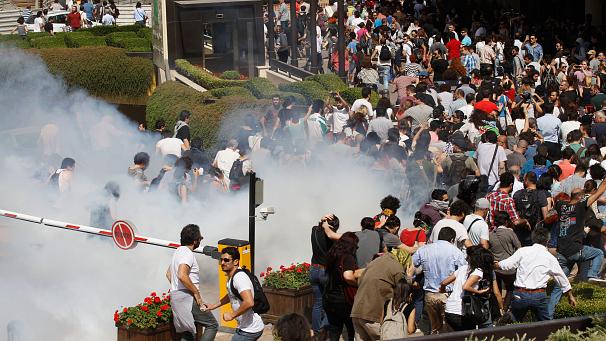Turkey’s Prime Minister Recep Tayyip Erdogan on Friday agreed to halt plans to redevelop an Istanbul park at the center of two weeks of mass anti-government unrest, in a move protesters welcomed as "positive".
Turkey's Prime Minister Recep Tayyip Erdogan on Friday agreed to halt plans to redevelop an Istanbul park at the center of two weeks of mass anti-government unrest, in a move protesters welcomed as "positive".
It marked the first easing of tensions in the standoff, which has presented the government with the biggest challenge of its decade-long rule.
 Hours after giving a "last warning" to defiant demonstrators camping out in Gezi Park, Erdogan made the concession in his first talks with a key group of protesters to defuse tensions in the crisis.
Hours after giving a "last warning" to defiant demonstrators camping out in Gezi Park, Erdogan made the concession in his first talks with a key group of protesters to defuse tensions in the crisis.
"The positive outcome from tonight is the prime minister's explanation that the project will not continue before the final court decision," Tayfun Kahraman, a spokesman for the Taksim Solidary group, seen as the most representative of the protest movement, said in televised remarks.
A peaceful sit-in to save Gezi Park's 600 trees from being razed prompted a brutal police response on May 31, spiralling into nationwide outpourings of anger against Erdogan and his ruling Justice and Development Party (AKP), seen as increasingly authoritarian.
The promise to abide by a court decision suspending the redevelopment of Gezi Park was hailed as a win by the protesters, who had earlier balked at Erdogan's offer to hold a referendum over plans to reconstruct Ottoman-era military barracks on the site in return for evacuating the park.
Speaking after the four-hour emergency meeting, Deputy Prime Minister
Huseyin Celik said the government would respect the court's decision on the project suspension and insisted a popular vote to seal the fate of the park
would go ahead.
"But Gezi Park protesters should stop their demonstration now," he warned.
The court process is expected to take several months. In the meantime, a probe is under way to investigate the use of excessive police force in dealing with the protesters across the country, Celik added.
Some 5,000 people have been injured and four were killed by the police so far, because of the use of tear gas, rubber ballets and water cannons on demonstrators.